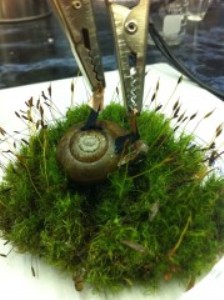A biofuel cell has been implanted in a living snail by a research team led by Professor Dr Eugeny Katz, the Milton Kerker Chair of Colloid Science at Clarkson University.
 Implantation of a biofuel cell in a living snail
Implantation of a biofuel cell in a living snail
The cell is currently operating in the snail and continuously producing electrical energy for a long period of time. The glucose produced by the snail is used as a fuel to generate energy.
The research team includes Clarkson’s Research Professors, Vera Bocharova, Jan Halámek and Lenka Halámková; Alon Szczupak, a graduate student at Clarkson; and Professor Lital Alfonta from Ben-Gurion University of the Negev in Beer-Sheva, Israel.
With proper feeding and relaxing, the snail has been able to regenerate glucose, which is used by biocatalytic electrodes. Thus, the living organism has been generating electrical micropower continuously. The biotechnological living device has the potential to function in a natural environment and produce sustainable electrical energy for powering several bioelectronic devices.
A similar research is performed with an aim to develop insect cyborgs, for which the U.S. Department of Defense provides funding support. There are only few cases of abiotic and enzymatic biofuel cells that are functioning in living animals. The process of implanting biocatalytic electrodes into small living animals and generating electrical power is very difficult and till now it has not been achieved.